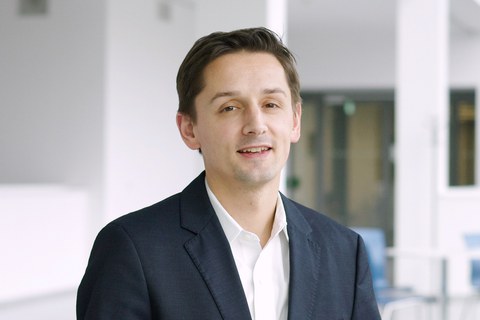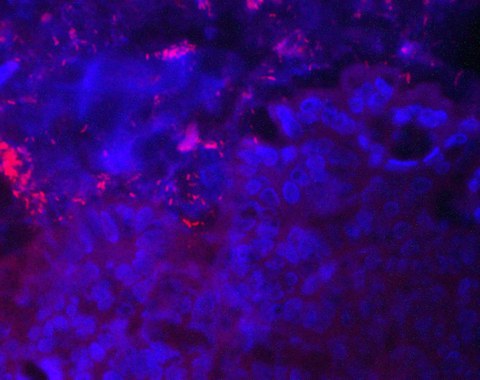May 12, 2017
Research on colon cancer: CRTD Group leader Professor Sebastian Zeißig honored with the Theodor-Frerichs-Preis of the Deutsche Gesellschaft für Innere Medizin

Prof. Sebastian Zeißig
Prof. Dr. med. Sebastian Zeißig, group leader at the DFG Research Center for Regenerative Therapies Dresden (CRTD) - Cluster of Excellence at the TU Dresden and physician at the Department of Medicine I, University Hospital Carl Gustav Carus Dresden, has been honored with the Theodor-Frerichs-Preis of the Deutsche Gesellschaft für Innere Medizin e.V. (DGIM). With this prize, the expert association for internists honors Sebastian Zeißig’s outstanding research on the causes of colon cancer. In 2016, the group of Prof. Zeißig proved the decisive role of gut bacteria in the regulation of intestinal stem cells and the development of colon cancer. This discovery is essential for developing new therapies not only for cancer but for promoting regeneration of the intestine.

Bacteria (red) in the area of intestinal tumors (blue)
On April 30, 2017 - Prof. Sebastian Zeißig and his colleague from Hamburg Prof. Samuel Huber (University Medical Center Hamburg-Eppendorf) were awarded the Theodor-Frerichs-Preis for their groundbreaking work that explored the mechanisms contributing to inflammation and carcinogenesis in the intestine. „The acknowledgment of my work with one of the most prestigious awards is a great honor“, says Prof. Zeißig.
The intestinal surface is a rapidly renewing tissue, in which regeneration is driven by stem cells. Damage of these intestinal stem cells, as observed upon chemotherapy, leads to impaired regeneration of the intestine and severe illness. On the other hand, genetic mutations that further promote the growth of intestinal stem cells are associated with uncontrolled organ regeneration and the development of colon cancer. Tight control of intestinal stem cells is therefore required to allow regeneration but prevent cancer. With the award-winning work, Sebastian Zeißig’s group demonstrated that bacteria within the normal gut microbiota can invade the intestinal tissue and activate an enzyme in stem cells that facilitates stem cell growth and cancer development. This discovery forms the basis of novel therapies for the prevention and treatment of colon cancer. “In the future, bacteria engineered to block these pathways could potentially be used as probiotics which act in a local manner in the intestine to inhibit the growth of colon cancer and to perhaps even prevent its development”, Sebastian Zeißig explained. Since stem cells are also critical for regeneration in the intestine, therapies that target these pathways may further help to design new drugs that reduce side effects associated with chemotherapy, radiotherapy or other causes of intestinal damage.
The award, which carries a prize money of 30,000 Euros, is presented by the Deutsche Gesellschaft für Innere Medizin to the best, preferably clinical-experimental, work in the field of internal medicine that was submitted for consideration. The presentation of the prize took place at the festive evening event of the annual congress of the Deutsche Gesellschaft für Innere Medizin.
Scientific publication
"Epithelial calcineurin in the control of microbiota-dependent intestinal tumor development" (NMED-A75820A)
DOI 10.1038/nm.4072
Media Inquiries
Franziska Clauß
Press Officer
Phone: +49 351 458 82065
Founded in 2006, the DFG Research Center for Regenerative Therapies Dresden (CRTD), Cluster of Excellence at the TU Dresden has passed the second phase of the Excellence Initiative which aims at promoting top-level research and improving the quality of German universities and research institutions. The goal of the CRTD is to explore the body's self-healing potential and to develop completely new, regenerative therapies for hitherto incurable diseases. The key areas of research include haematology and immunology, diabetes, neurodegenerative diseases and bone regeneration. At the moment, eight professors and ten group leaders are working at the CRTD – integrated into an interdisciplinary network of 87 members at seven different institutions within Dresden. In addition, 21 partners from industry are supporting the network. The synergies in the network allow for a fast translation of results from basic research to clinical applications.
